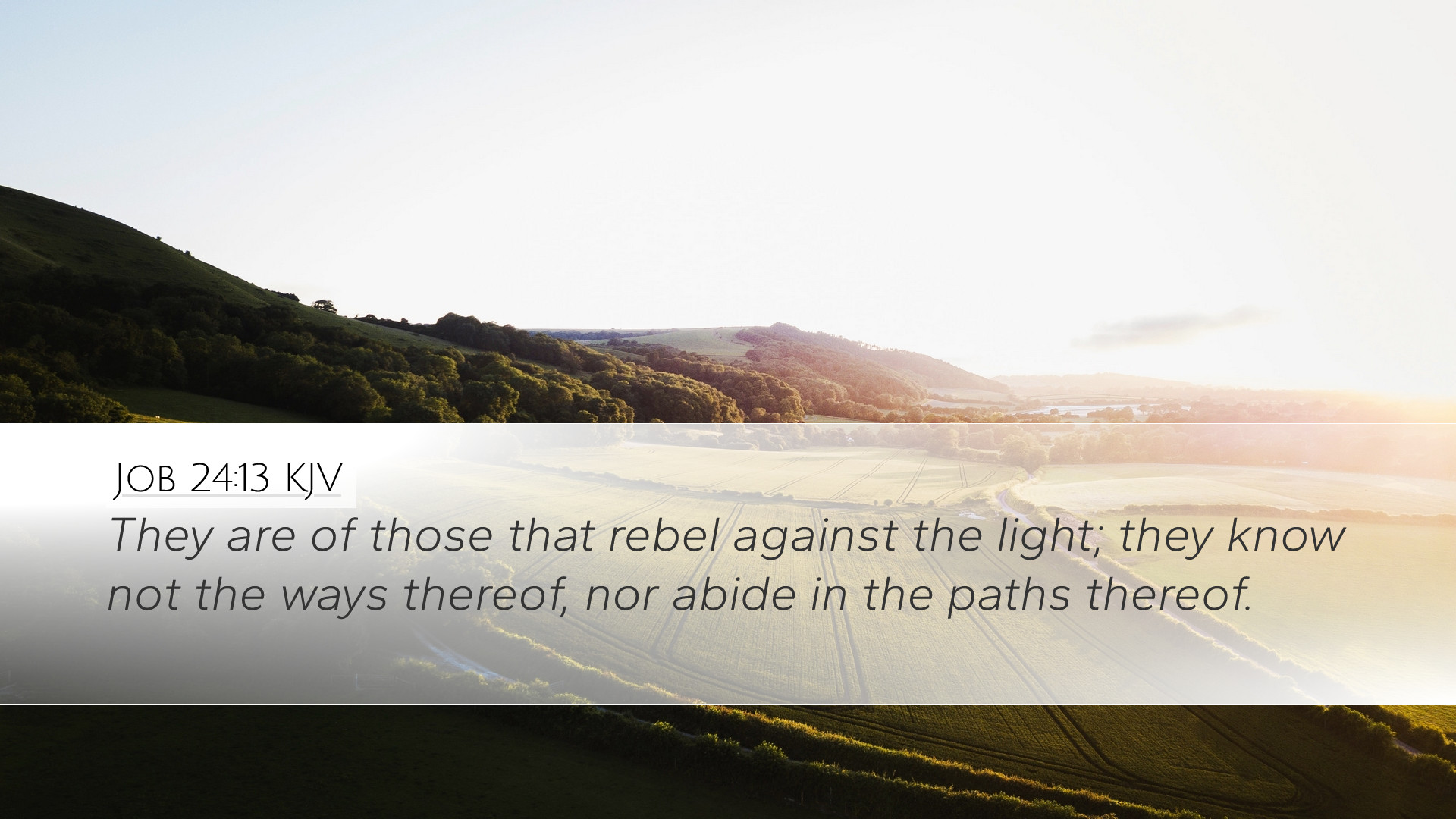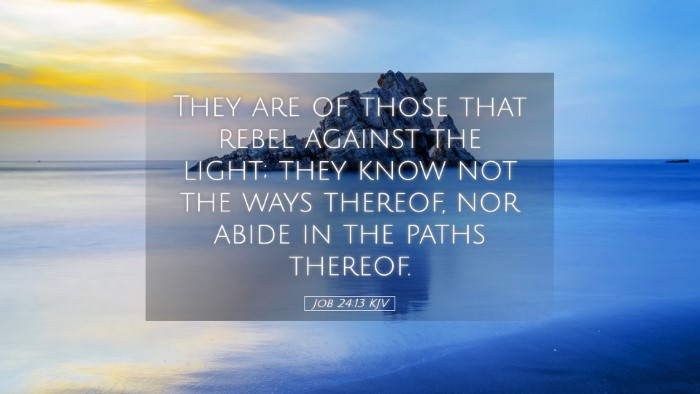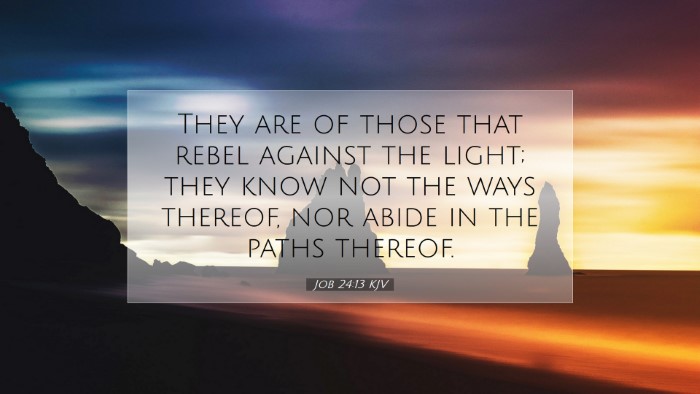Old Testament
Genesis Exodus Leviticus Numbers Deuteronomy Joshua Judges Ruth 1 Samuel 2 Samuel 1 Kings 2 Kings 1 Chronicles 2 Chronicles Ezra Nehemiah Esther Job Psalms Proverbs Ecclesiastes Song of Solomon Isaiah Jeremiah Lamentations Ezekiel Daniel Hosea Joel Amos Obadiah Jonah Micah Nahum Habakkuk Zephaniah Haggai Zechariah MalachiJob 24:13
Job 24:13 KJV
They are of those that rebel against the light; they know not the ways thereof, nor abide in the paths thereof.
Job 24:13 Bible Commentary
Commentary on Job 24:13
Job 24:13 states, "They are of those who rebel against the light; they do not know its ways nor abide in its paths." This verse presents profound insights into human nature and the moral struggles faced by individuals who resist truth and righteousness. Exploring this text through the lens of esteemed biblical commentators provides a valuable understanding for pastors, students, theologians, and Bible scholars.
Contextual Overview
Before delving into the specific commentary, it is vital to consider the broader context of the Book of Job. This ancient text grapples with the themes of suffering, justice, and the nature of God. Job, a man of exemplary character, suffers immense loss and pain, prompting questions about divine justice and the moral order of the universe. In this setting, Job laments the apparent success of the wicked, revealing the tension between their flourishing and the suffering of the righteous.
Commentary Insights
Matthew Henry's Commentary
Matthew Henry emphasizes that the passage underscores the nature of the wicked as those who "rebel against the light." He notes that the "light" represents knowledge, truth, and moral guidance provided by God. Those who reject this light choose to walk in darkness, leading to their own destruction. Henry further elaborates that the refusal to walk in God's paths signifies a deliberate choice to oppose divine will, with devastating consequences. He calls attention to the moral implications of such rebellion, suggesting that it ultimately leads to chaos and suffering not only for the individual but also within the community.
Albert Barnes' Notes
Albert Barnes offers a detailed exploration of the terms used in Job 24:13. He interprets "rebellion against the light" as indicative of willful ignorance and a hardened heart. He draws a parallel between the physical light and spiritual enlightenment, stating that rejecting either represents a significant moral failure. Barnes points out that the "ways" referred to in the text symbolize the paths of righteousness, which the wicked ignore. This refusal to follow God's ordinances not only alienates individuals from God but positions them against the very truths that can lead to life and enlightenment.
Adam Clarke's Commentary
Adam Clarke delves into the original Hebrew terms to expound on the implications of rebellion against God’s light. He notes the significance of light in Hebrew thought as a metaphor for knowledge, wisdom, and divine revelation. Clarke particularly emphasizes the active choice made by individuals to turn away from divine truth, depicting this choice as a rejection of the moral compass that God has established. He asserts that this rebellion is not merely a passive state but a conscious decision to engage in unrighteousness and to neglect the paths of justice laid out in Scripture. Clarke’s analysis highlights the tragic irony that those who reject the light endure deeper darkness.
Theological Implications
This verse, coupled with the insights from these commentaries, raises essential theological questions regarding free will, human accountability, and divine justice. These scholars affirm that while God provides His light, individuals must choose to either accept or reject it. Such dynamics underline the gravity of sin and rebellion in personal and communal contexts.
- Free Will and Responsibility: The commentators agree that God honors human agency, allowing individuals to either embrace or reject the truth He offers. This freedom implies personal responsibility for one's moral choices.
- The Nature of Sin: The consistent theme of rebellion against light illustrates sin's active nature. The choice to rebel signifies an abandonment of divine truth, leading to spiritual blindness and moral decay.
- Consequences of Rebellion: As articulated by Henry, Barnes, and Clarke, the implications of straying from God's paths extend beyond individual consequences; they contribute to broader societal chaos and injustice.
Practical Applications
In light of the commentary on Job 24:13, several practical applications emerge for contemporary believers:
For Pastors and Leaders
Church leaders are called to guide their congregations towards the light of God’s truth, teaching not only about the blessings of following His paths but also warning against the dangers of rebellion. They must encourage ongoing engagement with Scripture and prayer to foster spiritual insight.
For Theologians
Theologians are invited to explore the intricate relationship between human freedom and divine sovereignty, particularly in the context of rebellion and moral accountability. This verse serves as a foundational text for discussions of grace, judgment, and the human condition.
For Students of the Bible
Bible students are encouraged to reflect on their personal choices in light of God's truth. Understanding the implications of rejecting divine guidance can motivate deeper study and appreciation for the wisdom found in Scripture.
Conclusion
Job 24:13 encapsulates a profound truth about human nature and the consequences of rebellion against divine illumination. Insights from Matthew Henry, Albert Barnes, and Adam Clarke offer rich theological and practical considerations, shedding light on the importance of embracing God's ways. As believers navigate the complexities of faith, this verse serves as a poignant reminder of the pivotal choice between light and darkness within the moral landscape of life.


